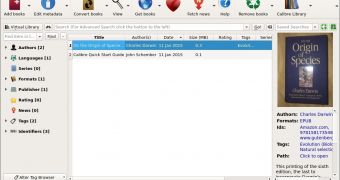Kovid Goyal had the pleasure of announcing earlier today, March 13, the immediate availability for download of a new maintenance release of the powerful and acclaimed Calibre eBook manager and converter utility for GNU/Linux, Mac OS X, and Microsoft Windows operating systems.
Calibre 2.21 introduces a number of new features, among which we can mention the ability to open ebook files and convert them in external applications via the right-click context menu in the Book Details panel, as well as support for restoring disabled confirmation prompts in preferences. A confirmation dialog has been added when removing saved searches.
“Now, you can right click on an ebook format or the cover in the Book Details panel, and open it with any application installed on your computer. calibre will automatically present you with a list of application capable of opening the file. Simply choose one, or if your particular application is not auto-detected, you can browse for it manually,” says Kovid Goyal.
Additionally, it supports automatic restricting of the rename and delete functions for items in the Tag Browser to the current Virtual Library, and implements new CSS Level 3 selectors in the built-in conversion component or the application. The last used ebook formats are now remembered when using the edit ToC (Table of Contents) button.
Numerous bugs have been resolved in Calibre 2.21
In addition to the new features mentioned above, Calibre 2.21 fixes a great number of bugs that have been discovered and reported by users since Calibre 2.20. It fixes issues with the Linux binary installation, Books list, PyQt and Qt 5.4.1 compatibility, E-book viewer, the Table of Contents editor, as well as with DOCX, AZW3, and FB2 input, and PDF output.
Last but not least, the Pando Daily news source has been added, and the Spektrum der Wissenschaft, New Musical Express, and The Daily Mirror news sources have been improved. Download Calibre 2.21 for Linux, Mac OS X, and Microsoft Windows operating systems right now from Softpedia.

 14 DAY TRIAL //
14 DAY TRIAL //